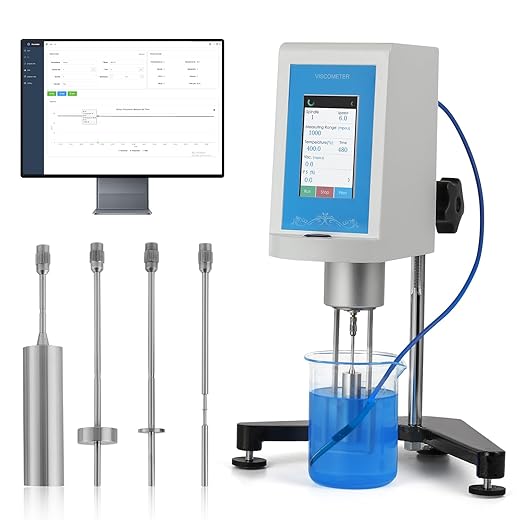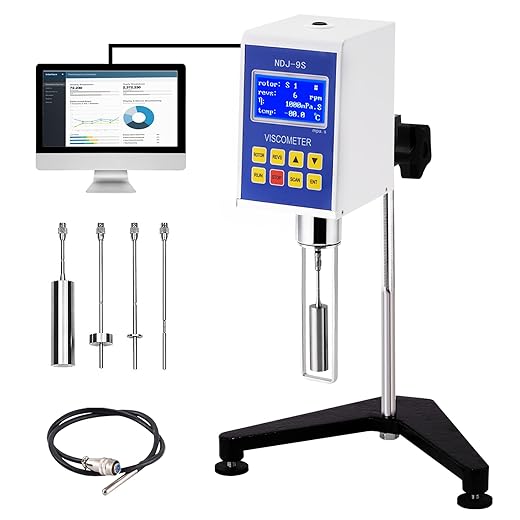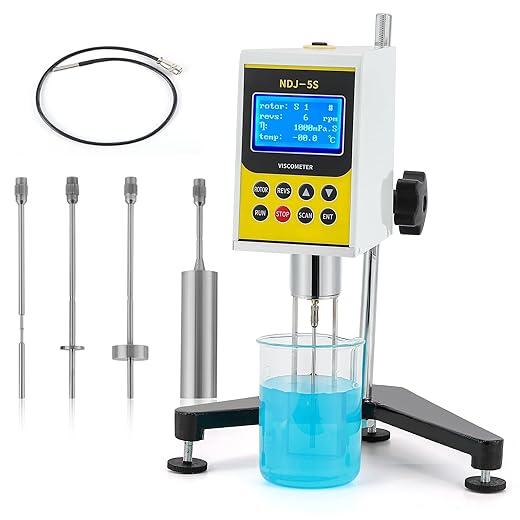









Understanding Viscosity Meters: A Comprehensive Guide
Viscosity meters are essential instruments in various industries, from food processing to pharmaceuticals. But what exactly is viscosity, and why does it matter? In simple terms, viscosity is the measure of a fluid’s resistance to flow. Imagine trying to pour honey versus water; honey flows slowly due to its high viscosity, while water flows freely with little resistance. This article will delve into the importance of viscosity meters, how they work, and what you should consider when choosing one for your needs.
What is a Viscosity Meter?
A viscosity meter, also known as a viscometer, is a device used to measure the viscosity of a fluid. By quantifying the internal friction within the fluid, these meters help determine how a liquid behaves under different conditions. This information is invaluable for quality control, product formulation, and research and development across various sectors.
Why is Viscosity Important?
Understanding viscosity is crucial. Think of it this way: if you’re baking a cake, the consistency of your batter can affect the final product. If it’s too thick, the cake may not rise properly; if it’s too thin, it won’t hold its shape. Similarly, in industrial applications, the viscosity of a liquid can impact everything from the ease of pumping to the efficiency of mixing.
Types of Viscosity Meters
There are several types of viscosity meters, each suited for different applications. Let’s explore a few of the most common types:
1. Capillary Viscometers
Capillary viscometers measure viscosity by allowing a fluid to flow through a narrow tube. The time it takes for a specific volume of liquid to pass through provides a direct measurement of viscosity. This method is often used for Newtonian fluids, which have a constant viscosity regardless of shear rate.
2. Rotational Viscometers
Rotational viscometers work by rotating a spindle in the fluid. The force required to turn the spindle is measured and used to calculate viscosity. This type is versatile and can handle both Newtonian and non-Newtonian fluids, making it a popular choice in many industries.
3. Falling Ball Viscometers
These viscometers measure the time it takes for a ball to fall through a fluid. The rate of descent is influenced by the fluid’s viscosity. This method is particularly useful for measuring the viscosity of thicker fluids.
How to Choose the Right Viscosity Meter
Selecting the right viscosity meter can be daunting, but focusing on a few key factors can simplify the process:
1. Application
Consider the specific application for which you need the viscosity meter. Are you working with food products, industrial oils, or pharmaceuticals? Different industries may require different types of viscometers.
2. Fluid Characteristics
Think about the types of fluids you’ll be measuring. Are they Newtonian (consistent viscosity) or non-Newtonian (varying viscosity)? This will dictate which type of viscometer is most suitable.
3. Temperature Sensitivity
Viscosity can change significantly with temperature. If your applications involve temperature fluctuations, look for a meter that can accommodate these changes.
4. Ease of Use
Choose a viscosity meter that is user-friendly, especially if multiple operators will be using it. Look for features such as digital displays and automated measurement capabilities.
5. Budget
Finally, consider your budget. Viscosity meters can range from relatively inexpensive handheld models to high-end laboratory equipment. Identify what features are essential for your needs and choose accordingly.
Real-World Applications of Viscosity Meters
Now that you understand what viscosity meters are and how to choose one, let’s look at how they are applied in various industries:
1. Food and Beverage Industry
In the food industry, viscosity meters help ensure product consistency. For instance, the viscosity of sauces, dressings, and beverages needs to be consistent to meet consumer expectations. A change in viscosity can indicate spoilage or improper formulation.
2. Pharmaceutical Industry
In pharmaceuticals, the viscosity of liquid medications is crucial for proper dosing and effectiveness. Viscosity meters ensure that syrups, suspensions, and emulsions are formulated correctly, providing reliable therapeutic outcomes.
3. Oil and Gas Industry
In the oil and gas sector, viscosity meters are used to monitor the flow of crude oil and other fluids. Understanding viscosity helps optimize extraction and refining processes, ultimately leading to more efficient operations.
Conclusion
Viscosity meters play a vital role across various industries, ensuring product quality and consistency. By understanding the different types of viscosity meters, their applications, and how to choose the right one, you can make informed decisions that enhance your operations. Whether you’re in food production, pharmaceuticals, or any other sector, a reliable viscosity meter can be an invaluable tool in your toolkit.
FAQs
1. What’s the difference between Newtonian and non-Newtonian fluids?
Newtonian fluids have a constant viscosity, meaning they flow the same way regardless of the shear rate. Non-Newtonian fluids, on the other hand, exhibit a change in viscosity when subjected to stress or shear.
2. How often should I calibrate my viscosity meter?
Calibration frequency depends on usage and manufacturer recommendations. Generally, it’s advisable to calibrate regularly, especially if the meter is used in a critical application.
3. Can I measure the viscosity of a solid?
Viscosity meters are designed to measure liquids. However, some specialized equipment can assess the flow behavior of semi-solids or pastes, but these often require different methodology.
